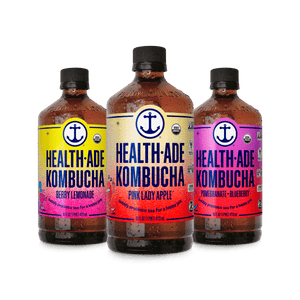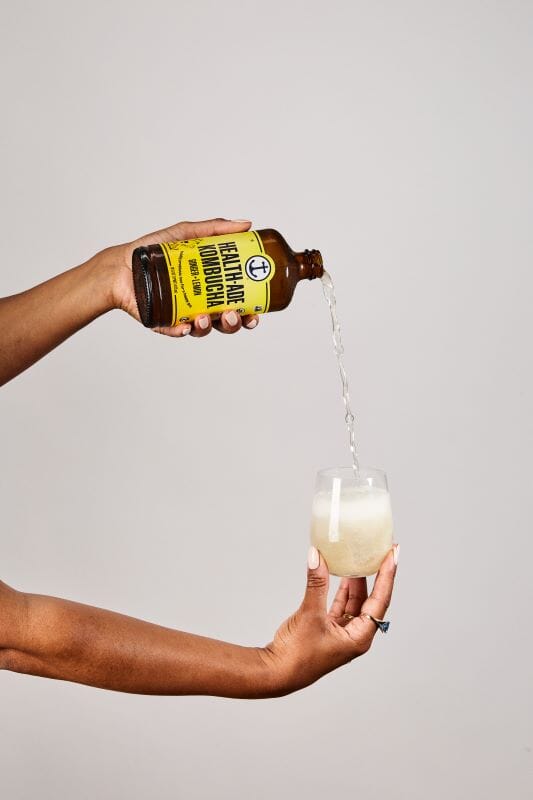
Kombucha | 12 Pack
Fan Favorite Variety Pack
One-time Purchase
49.95

Copied URL to clipboard!
Photography by Matt Armendariz; courtesy of Kombucha Kamp. Guest post by Hannah Crum & Alex LaGory, Kombucha Kamp of The Big Book of Kombucha.
What is bubbly, sweet, sour and full of living organisms? Kombucha, of course! It’s easy to make: just combine tea, sugar and a SCOBY (symbiotic culture of bacteria and yeast) with starter liquid in a glass jar, then allow the microbes to work their magic. Kombucha has been passed around as folk medicine by people around the world for hundreds of years, and many of the old names for this brew hint that it is a revered elixir that can lead to immortality. Obviously this is a romantic and exaggerated claim, but is there any truth behind it? Perhaps by examining the components of a Kombucha brew, some knowledge of its elusive allure will emerge.
Let’s start with the obvious - Kombucha is made from tea! Scientifically known as camellia sinensis, the tea plant’s impact on humans has been well documented, with numerous studies highlighting the nutritional components of tea such as antioxidants, polyphenols, ECGC (epigallocatechin gallate), catechins and more, indicating these elements can assist with lowering the risk of cancer, reduce inflammation and boost immunity. Fermentation, nature’s ancient transformational miracle, is known to simultaneously enhance beneficial properties and reduce toxic properties of whatever it comes in contact with. This is accomplished by setting loose lots of tiny organisms to break down the elements, sort of “pre-digesting” them, which in turn makes them easier for the body to process.
As we explain in The Big Book of Kombucha (a copy of which is provided to each new Health-Ade employee!), the yeast and bacteria in a Kombucha SCOBY get to work right away consuming the sugar and converting it to healthy acids (mostly acetic acid which is also found in vinegar) and natural bubbles. However, most vinegars are a 5-8% acetic acid, which is quite a punch in the mouth if drunk straight! Kombucha is usually 1/10th as strong, between .5-.8% acetic acid. Add in a few other healthy acids in smaller amounts, with tea, flavors, and just a hint of residual sugar to smooth the acidic bite, offering that delicious balance of sour and sweet. Vinegar has long been considered healthy for the body and environment, and was historically used to treat drinking water to improve taste and quality. Acetic acid and the other organic acids produced through the vinegar fermentation process have been shown to be “antimicrobial, antioxidative and antidiabetic” among other properties, according to many different studies. An easy way to think of Kombucha is essentially as “tea vinegar.” But the story doesn’t end there. Other organic acids produced by Kombucha fermentation, like gluconic and glucuronic acid specifically, support a healthy liver metabolism. As the name implies, a healthy liver helps you, well, live! Plus Kombucha also contains vitamins and nutrients (in trace amounts) in a living form, which means our body can instantly absorb those elements. A variety of enzymes, B vitamins, vitamin C, and amino acids all are present in small amounts. And the comment we hear most often is that drinking Kombucha, “just makes me feel good.”
So whether you are drinking it for the natural effervescence, delicious taste, or as a substitute to soft drinks and sports drinks, it's good to know that all of these elements combine to create a harmonious experience that provides more than just a fun flavor profile. Of course, like all foods, no one food is going to provide all of the nutrition we need. And as we are learning from research studies like the Human Microbiome project, a wide variety of organisms can live in our guts, so adding several different types of fermented foods and drinks can help keep the body in balance. So tell us, how do you booch? What’s your favorite flavor?
Did you know that Health-Ade Kombucha is proudly made with Kombucha Kamp cultures! Ready to make your own Kombucha at home? Click here for a free DIY Guide and Recipe. For more inspiration, follow us on Instagram. Find this interesting? Learn more about kombucha or read more Health-Ade blog posts.